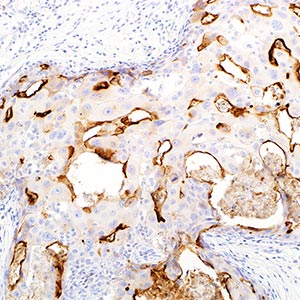
MUC1 (EP85)

Mucin 1 (MUC1) is a transmembrane glycoprotein that protects epithelial cells from injury caused by external stimuli. In addition to this role, MUC1 is involved in cell-cell adhesion, proliferation, motility, invasion and survival. In epithelial cells, MUC1 expression is regulated by binding of TNFα to TNFR1 and activation of the NFκB pathway. In human skin, MUC1 is not expressed in normal epidermis but rather in pre-malignant and malignant conditions. MUC1 has also been expressed in the epidermis of psoriatic plaques of biopsies from patients diagnosed with psoriasis vulgaris. MUC1, in addition to being localized at the apical surface of some suprabasal keratinocytes, is also localized over the entire cell surface of some of these cells and some basal keratinocytes. Conversely, no MUC1 immunoreactivity is typically detected in the epidermis of normal skin.1
Reactive gastropathy is the second most common diagnosis made on gastric biopsies. Increased epithelial proliferation and modifications of epithelial cytokeratin profile, distinct from those of Helicobacter pylori gastritis, have been previously reported. Loss of MUC1, either patchy or complete, was noted in 67% of the cases.2
The overexpression of MUC1 was found in 78% of papillary thyroid carcinomas (PTC).3 Multivariate analysis has shown a strong association of MUC1 expression with the presence of the BRAF (V600E) mutation and lymph node metastasis in PTC. Lymph node metastasis was the most important risk factor of relapse.4 In a study of thymic epithelial tumors, MUC1 was closely associated with VEGF, p53 and micro-vessel density (MVD). A 94% positive rate of MUC1 expression in thymic carcinomas and 0% in type B3 thymomas, demonstrated a significant difference. The expression of MUC1 was closely related to the grade of malignancy in thymic epithelial tumors. Positive expression of MUC1 was significantly associated with poor outcome in this disease. MUC1 may be useful marker for differentiating thymic carcinoma from type B3 thymoma.5
